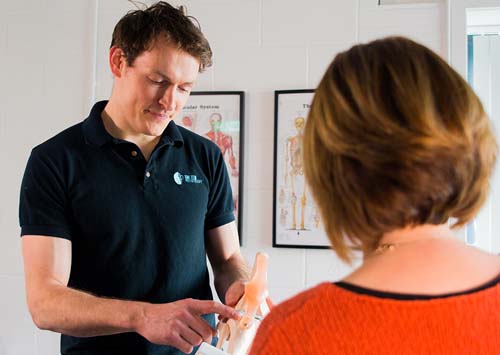Physiotherapy and Osteoporosis?
Bone is living tissue and is broken down and replaced regularly, just like all other tissues in our bodies. Osteoporosis occurs when the creation of new bone does not keep up with the breakdown of old bone. Osteoporosis causes our bones to weaken, as they become more porous.
The Irish Osteoporosis Society estimates that 300,000 people in Ireland have osteoporosis. 1 in 2 women over 50 and 1 in 4 men over 50 will develop an osteoporosis related fracture.
Peak bone mass occurs in our late teens and continues into our twenties; therefore, it is vital during these years to optimise bone health through adequate calorie consumption, weight bearing exercise, and consumption of vitamin D and calcium.
As our bone density or strength decreases, our bone moves from healthy to osteopenic to osteoporotic.
Osteopenia is the early stage of osteoporosis, meaning there is a bigger risk of developing a fracture. A diagnosis of osteopenia is a warning sign to start looking after your bone health. Physiotherapy can play a vital role in preventing osteopenia developing into osteoporosis.
How is osteoporosis diagnosed?
Usually, a person will not know that they have osteoporosis until they have fallen and fractured a bone. If you have sustained a “low-trauma fracture”, i.e. breaking a bone from tripping or falling from standing height, this may mean you have osteopenia or osteoporosis.
Your GP may refer you for a DEXA scan to measure your bone mineral density (or bone strength). The result of this scan shows if you do or do not have osteoporosis / osteopenia.
The FRAX tool can be used to assess one’s risk of fractures. Click here to access the tool:
Risk factors for developing Osteoporosis:
- Females (post-menopausal)
- People over 40
- Sedentary lifestyle (little or no exercise)
- Low calcium intake
- Anorexia
- Thyroid disease (overproduction of the thyroxine hormone may cause bone loss)
- Family history of osteopenia / osteoporosis
- Excessive alcohol consumption
- Smoking
- History of steroid medications use
How can Physio help a patient with Osteoporosis?
Exercise plays an important role in bone health. Aerobic and resistance exercise has been proven to improve bone density in people with osteopenia and osteoporosis, as well as playing a vital role in falls prevention. Our physiotherapists work with individuals with osteoporosis to enable them to begin exercising safely and confidently, thus helping reduce further falls and fractures. It is never too late to start!
To get in touch email us on [email protected] or phone us on (01) 9069566. Follow us on Instagram for physiotherapy and clinic Updates.

